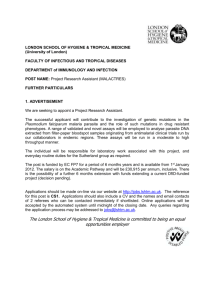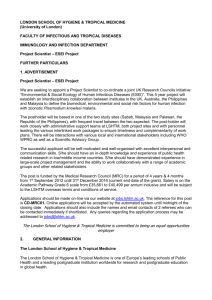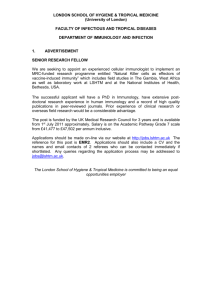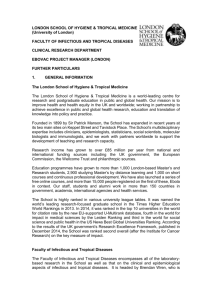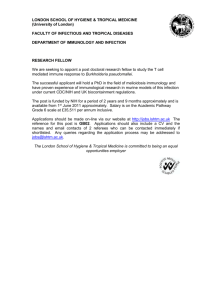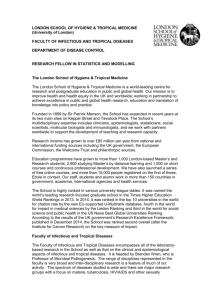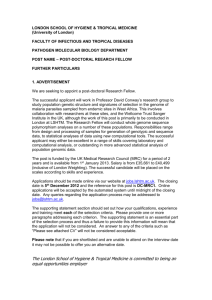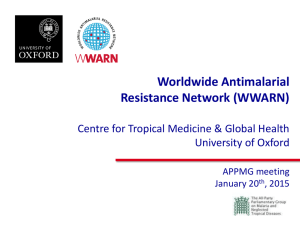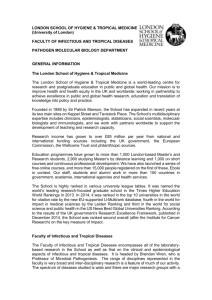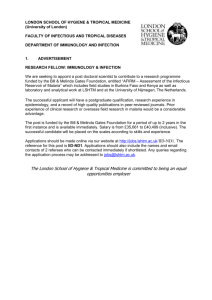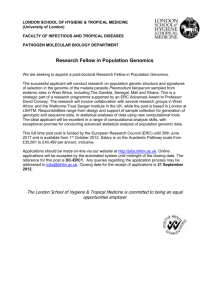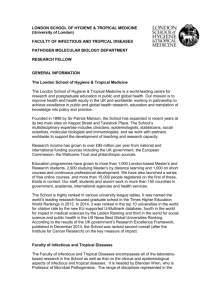Faculty of Infectious and Tropical Diseases
advertisement
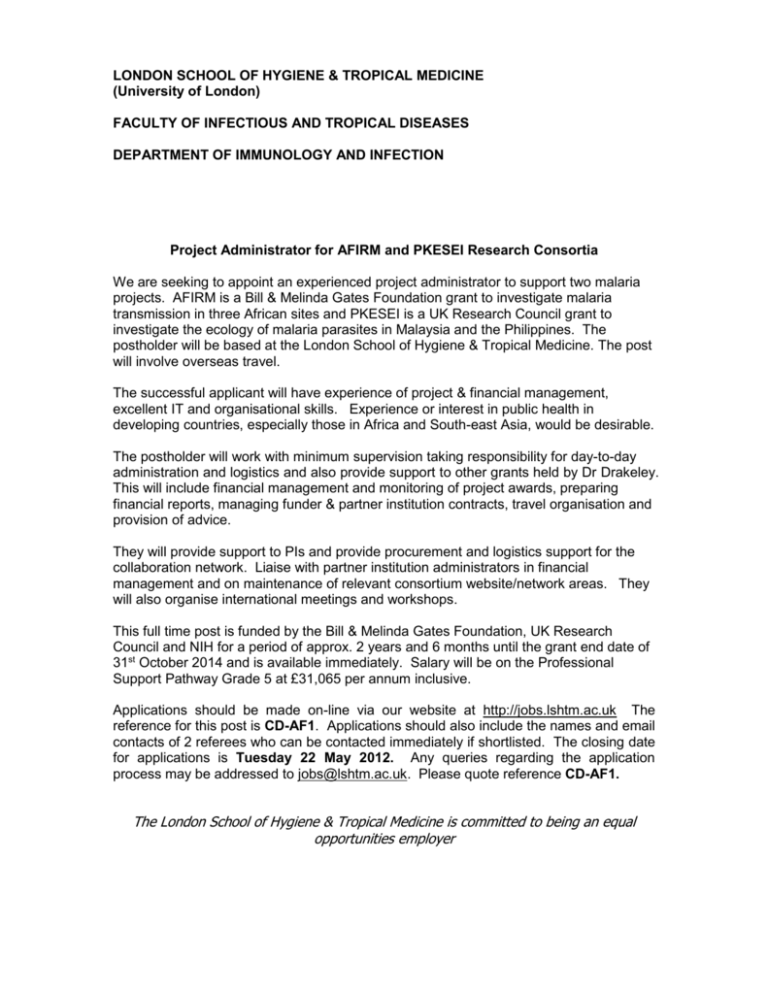
LONDON SCHOOL OF HYGIENE & TROPICAL MEDICINE (University of London) FACULTY OF INFECTIOUS AND TROPICAL DISEASES DEPARTMENT OF IMMUNOLOGY AND INFECTION Project Administrator for AFIRM and PKESEI Research Consortia We are seeking to appoint an experienced project administrator to support two malaria projects. AFIRM is a Bill & Melinda Gates Foundation grant to investigate malaria transmission in three African sites and PKESEI is a UK Research Council grant to investigate the ecology of malaria parasites in Malaysia and the Philippines. The postholder will be based at the London School of Hygiene & Tropical Medicine. The post will involve overseas travel. The successful applicant will have experience of project & financial management, excellent IT and organisational skills. Experience or interest in public health in developing countries, especially those in Africa and South-east Asia, would be desirable. The postholder will work with minimum supervision taking responsibility for day-to-day administration and logistics and also provide support to other grants held by Dr Drakeley. This will include financial management and monitoring of project awards, preparing financial reports, managing funder & partner institution contracts, travel organisation and provision of advice. They will provide support to PIs and provide procurement and logistics support for the collaboration network. Liaise with partner institution administrators in financial management and on maintenance of relevant consortium website/network areas. They will also organise international meetings and workshops. This full time post is funded by the Bill & Melinda Gates Foundation, UK Research Council and NIH for a period of approx. 2 years and 6 months until the grant end date of 31st October 2014 and is available immediately. Salary will be on the Professional Support Pathway Grade 5 at £31,065 per annum inclusive. Applications should be made on-line via our website at http://jobs.lshtm.ac.uk The reference for this post is CD-AF1. Applications should also include the names and email contacts of 2 referees who can be contacted immediately if shortlisted. The closing date for applications is Tuesday 22 May 2012. Any queries regarding the application process may be addressed to jobs@lshtm.ac.uk. Please quote reference CD-AF1. The London School of Hygiene & Tropical Medicine is committed to being an equal opportunities employer 2. GENERAL INFORMATION The London School of Hygiene & Tropical Medicine The London School of Hygiene & Tropical Medicine is one of Europe’s leading schools of Public Health and a leading postgraduate institution worldwide for research and postgraduate education in global health. Part of the University of London, the London School is the largest institution of its kind in Europe with a remarkable depth and breadth of expertise encompassing many disciplines. The School was ranked one of the top 3 research institutions in the country in the Times Higher Education’s 'table of excellence', which is based on the 2008 Research Assessment Exercise (RAE). In 2009, the School became the first UK institution to win the Gates Award for Global Health. The School’s environment is a rich multicultural one: there are almost 4000 students from 100+ countries following 22 taught masters courses delivered either in London (~650) or through distance learning (~2700), and undertaking research degree training (~400). Over 40% of these students are from non-European countries. The largest growth has been in distance learning students (>40% over 3 years), though the Londonbased student population (where accommodation limits growth) is at its highest level ever. Alumni are working in more than 180 countries. The School has about 1500 staff drawn from over 60 nationalities. There are research collaborations with over 100 countries throughout the world, utilizing our critical mass of multidisciplinary expertise which includes clinicians, epidemiologists, statisticians, social scientists, economists, molecular biologists, immunologists, ophthalmologists, anthropologists, virologists, pharmacologists and nutritionists. At any one time around 100 School staff are based overseas, particularly in Africa and Asia. We have a strong commitment to partnership with institutions in low and middle income countries to support the development of teaching and research capacity. The School has expanded greatly in recent years. Its research funding now exceeds £67M per annum, much of it from highly competitive national and international sources. The commitment of staff to methodological rigour, innovative thinking and policy relevance will ensure that the School continues to occupy a leadership position in national and global health, adapting quickly to new challenges and opportunities. Mission To improve health and health equity in the UK and worldwide; working in partnership to achieve excellence in public and global health research, education and translation of knowledge into policy and practice. Faculty of Infectious and Tropical Diseases The Faculty of Infectious and Tropical Diseases encompasses all of the laboratorybased research in the School as well as that on the clinical and epidemiological aspects of infectious and tropical diseases. It is headed by Simon Croft, who is Professor of Parasitology. The range of disciplines represented in the faculty is very broad and inter-disciplinary research is a feature of much of our activity. The spectrum of diseases studied is wide and there are major research groups with a focus on malaria, tuberculosis, HIV/AIDS and other sexually transmitted diseases, vaccine development and evaluation, and vector biology and disease control. The Faculty is organised into four large research departments comprising: Pathogen Molecular Biology, Immunology and Infection, Disease Control, and Clinical Research. There is close interaction between scientists in different research teams. The Faculty has strong overseas links, which provide a basis for field studies and international collaborations in developed and developing countries. The teaching programme includes MSc courses, taught in-house and by distance learning, which are modular in structure, a variety of short-courses and an active doctoral programme (PhD and DrPH). Department of Immunology and Infection (Head: Professor Eleanor Riley) Research in the Department of Immunology and Infection centres on analysis of the host response to infection at the molecular, cellular and population levels. The goals are to develop a greater understanding of basic mechanisms of immunological protection versus pathology, and to apply this knowledge to the development of immunological interventions and the identification of correlates of immune status. Our work involves application of state-of-the-art cellular and molecular approaches to the in vitro analysis of pathogen-host cell interactions, to in vivo studies in models and to the study of immunity at the population level in disease endemic areas. Main areas of research include the regulation of acute and chronic inflammation; macrophage-pathogen interactions; cellular pharmacology; the production of cytokines during innate and acquired immune responses; T-cell function and antigen recognition; the mechanisms of immunopathology; the development of vaccines; and delivery systems for vaccines and drugs. Current research includes the role of acute phase proteins in resistance to infection, homeostasis and inflammatory disease, mechanisms of macrophage activation, control of cytokine synthesis and mammalian lectin interactions (J. Raynes); intracellular trafficking and secretory pathways of cells of the immune system (T. Ward); the role of innate responses in resistance to the bacterial pathogens, Mycobacterium tuberculosis and Burkholderia pseudomallei, activity and regulation of natural killer cells and their effect on macrophage activation and recruitment, regulation of chemokine receptors during infection and granulomatous tissue responses in the lung against Cryptococcus neoformans and Mycobacterium tuberculosis (G. Bancroft); correlates of protection against tuberculosis and studies of BCG vaccination, human CD8+ T-cell responses to mycobacterial antigens and synthetic peptides, use of whole blood assays in immunoepidemiology (H. Dockrell); cytokine and chemokine responses to leprosy, cellular composition and effects of steroids on skin and nerve lesions of reactional leprosy, identification of specific peptides for immunodiagnosis of leprosy (S. Young); innate and adaptive immunity to malaria including activation of natural killer cells, cytokine regulation in clinical immunity and immunopathology, regulation of antibody production and immunoglobulin class switching (E. Riley); using anti-malarial antibodies as a marker of malaria exposure & assessment of the use of sero-epidemiology to monitor and target malaria control measures www.seromap.com (C. Drakeley)transmission of Plasmodium falciparum malaria including antibody responses to gametocyte-infected erythrocyte surface antigens, effect of gamete antigen variability on transmission, gametocyte sequestration and development and gametocyticidal drug therapy (C. Sutherland); characterisation of protective immune mechanisms and defined antigens in attenuated vaccine models of schistosomiasis (Q. Bickle); impact of concomitant viral, bacterial, protozoal and helminth infections on induction of immune responses and immunopathology and T cell regulation and induction of mucosal immune responses during intestinal nematode infections (H. Helmby); the identification and evaluation of novel drugs and drug delivery systems for leishmaniasis, trypanosomiasis and malaria, interaction between antiprotozoal drugs and the immune response (L. Vivas, V. Yardley) Department of Pathogen Molecular Biology (Head: Professor John Kelly) Research in the Department of Pathogen Molecular Biology focuses on the molecular biology and genetics of pathogens and their hosts in the context of improving the understanding and control of infectious diseases. Aspects of pathogen biology of interest include: (i) determining the mechanisms of infection of globally important viral, bacterial and parasitic pathogens; (ii) deciphering the genetic diversity of selected disease agents in natural populations and to determine its epidemiological impact, (iii) studying immune evasion mechanisms of particular disease agents, (iv) exploiting parasitic, bacterial and viral pathogens as model biological systems and (v) developing practical applications including improved diagnostic tests and the identification and characterisation of vaccine candidates and drug targets. PMBD currently has funding to investigate, amongst others, the malaria parasite (Plasmodium spp), Chagas disease (Trypanosoma cruzi), African sleeping sickness (Trypanosoma brucei), amoebic dysentery (Entamoeba), the Leishmania species, bacterial food borne pathogens (Campylobacter jejuni and Yersinia enterocolitica), gastric ulcers/cancer (Helicobacter pylori), pseudomembranous colitis (Clostridium difficile), plague (Yersinia pestis), paddy field melioidosis (Burkholderia pseudomallei), Tuberculosis (Mycobacterium tuberculosis), Pneumonia (Streptococcus pneumoniae), Bluetongue viral disease of livestock, Herpesviridae, SARS, the hemorrhagic fever virus (RVFV) and the enteric rotavirus that cause significant diarrhoeal disease in infants developing countries. The long-term aim of PMBD research is to gain a fully rounded understanding of the complex and dynamic ways by which pathogens modulate virulence and interact with the human host. Such a holistic approach will vastly increase the scope for the rational of design of long-term intervention strategies to reduce the burden of infectious disease. In recent years such a mission has been significantly enhanced by the availability of whole genome sequences. Members of the Department are, or have been, involved in several pathogen genome projects including Herpes, Campylobacter jejuni, Yersinia pestis, Clostridium difficile, Entamoeba and Trypanosome species. In particular, post genome studies have facilitated research on more complex parasites such as Plasmodium, Entamoeba and Trypanosome species. The interpretation and exploitation of this basic information is the platform for numerous new avenues of research on pathogenesis, epidemiology and the evolution of virulence. Department of Clinical Research (Head: Prof Alison Grant) The Department of Clinical Research addresses infectious diseases of major public health importance in developing countries. Activities include trials of new therapies, vaccines and educational interventions; the development of new diagnostic tests; studies to elucidate the immunological and molecular correlates of pathogenesis and protective immunity, and to identify genetic polymorphisms conferring protection or susceptibility to infectious diseases; health services research which aims to identify the most efficient and cost-effective way to deliver health care; and health policy analysis. In addition to our many overseas collaborations, we have close links with the Hospital for Tropical Diseases, in new, purpose-built accommodation on the main UCL Hospital campus, five minutes walk from the School. The Wellcome Trust Bloomsbury Centre for Clinical Tropical Medicine is based in the Department, and currently supports five Clinical Training Fellows and two Career Development Fellows, most of whom are based overseas. Much of the Department’s research concerns HIV and related infections; in particular, the interaction between HIV infection and other sexually transmitted diseases, and between HIV infection and tuberculosis. We have longstanding and fruitful collaborations addressing these issues in Tanzania, Zambia, Uganda and South Africa. Brian Greenwood FRS is leading an initiative to strengthen malaria research in the School through new collaborative links in Africa. Research and teaching on blinding diseases in developing countries has been greatly strengthened by the recruitment of Allen Foster, who is Medical Director of CBM International, an NGO with programmes for the prevention of blindness and disability in over 100 countries; our research on trachoma has played an important part in framing the strategies adopted by the WHO and the new International Trachoma Initiative for the elimination of blinding trachoma by the year 2020. Department of Disease Control (Head: Dr Mark Rowland) This multidisciplinary Department includes epidemiologists, entomologists, anthropologists and social scientists, clinical scientists, public health engineers, and geographers. This range of expertise provides us with a battery of tools for focusing on the control of diseases that are insect-borne, water-borne or associated with poor hygiene – mostly in developing countries. Much of the research can be categorised as: evaluating disease control interventions; investigating implementation strategies including working with the private sector; understanding the factors underlying household behaviour in relation to family health; or determining how control resources can be targeted most efficiently. Particular attention is paid to research directed at current health policy issues, including the gap between policy and practice. The DFID Resource Centre for Water and Environmental Health (WELL) and the Hygiene Centre make up the Department’s Environmental Health Group, which plays a leadership role in research and operational support for hygiene promotion, water supply and sanitation. The Department also houses the largest research group in LSHTM working on malaria control, including the DIFD Team for Applied Research to Generate Effective Tools and Strategies for communicable disease control (TARGETs) and the Malaria Capacity Development Consortium (MCDC). The Department’s valuable mosquito colonies are used for testing repellent products and insecticides in the laboratory. The Department also includes a major grouping of researchers using spatial analysis in public health. Teaching The School offers 22 one year full-time taught courses leading to the Master of Science (MSc) degree of the University of London and the Diploma of the London School of Hygiene and Tropical Medicine (DLSHTM). The Faculty of Infectious and Tropical Diseases runs or contributes substantially to ten of these courses and the “Immunology of Infectious Diseases” course is run from within the Department of Immunology and Infection. In addition, the Faculty is responsible for the three-month Diploma in Tropical Medicine and Hygiene (DTM&H) and offers a range of specialist short courses lasting usually one or two weeks. Three MSc courses are also offered by Distance-based Learning, including one on Infectious Diseases. Research Training The School offers two doctoral training programmes. The MPhil/PhD degrees are designed for those who wish to go on to a full time research career. The DrPH is directed towards those who expect their careers to be more in the practice of public health. Project information AFIRM (Assessment of the Infectious Reservoir of Malaria) is a newly awarded 3 year grant from the Bill & Melinda Gates Foundation, USA ($2.5M) which will examine just who in endemic populations is responsible for transmitting malaria. The research partners and collaborating institutions include Centre National de Recherche et de Formation sur le Paludisme Burkina Faso; International Centre for Insect Physiology & Ecology, Kenya; Radboud University Nijmegen Medical Centre the Netherlands, Robert Sauerwein; KEMRI/Wellcome Trust Centre, Kilifi, Kenya and Imperial College, UK. LSHTM will coordinate the project and facilitate links between this group of collaborators and other related work, in particular the non-African malaria transmission studies. PKESEI is a grant funded by 4 UK Research Councils and administered by the MRC as part of a new call on integrated research (Plasmodium Knowlesi Environmental & Social Ecology of Human Infectious Diseases). The partners are a multi-disciplinary group from collaborating institutes in Malaysia and the Philippines together with the Universities of Glasgow and Greenwich in the UK and will focus on establishing the risk factors for human infection with a zoonotic malaria species, Plasmodium knowlesi. These grants are held at LSHTM in the Immunology and Infection Department. Dr Chris Drakeley is a PI on both projects together with Dr Rachel Hallett for PKESEI and Dr Teun Bousema for AFIRM. Ms Siobhan Renihan is the Departmental Administrator. Further information about work being undertaken can be obtained from Dr Chris Drakeley (chris.drakeley@lshtm.ac.uk). 3. JOB DESCRIPTION Post: Project Administrator for AFIRM and PKESEI Research Consortia Grade: Professional Support Pathway Grade 5 Responsible to: Dr Chris Drakeley (Principal Investigator, AFIRM & PKESI) Dr Rachel Hallett (Principal Investigator PKESEI grant) Dr Teun Bousema (Co-Principal Investigator, AFIRM) Head of Department of Immunology and Infection (currently Prof Eleanor Riley) Department: Immunology and Infection (IID) Start date: As soon as possible Main duties and responsibilities: Financial Management ● ● ● ● ● ● ● ● Financial management and monitoring of the Gates Foundation and UKRC awards (and management of other grants held by Dr Drakeley). This will include preparation of financial forecasts and production of summaries of the consortium finances as required. Independently troubleshooting on budgets; using own judgment to rectify current or possible budget deviations and other problems. To liaise closely with collaborators’ finance teams to ensure financial reporting meets the criteria required. Ensuring timely release of funds to collaborating institutions. Providing a considered interpretation of any financial or contractual correspondence from the funder. Managing and ensuring compliance to primary grant contracts between the funder and School. Co-operation with programme officers at BMGF and UKRC to maintain positive links. Liaising with the School’s Research Contracts Office and collaborating institutions’ equivalents to establish and amend subcontracts and research collaboration agreements with predefined budget dispersal plans for partners Monitoring consultancy agreements, including all contractual and financial arrangements arising from these. Communication ● ● ● Daily liaison with the PIs initiating discussions/meetings on issues that require attention. Garnering information to put forward ideas and give advice on possible solutions. Liaison with partner institutions in maintaining and updating the websites and network areas. Providing clarity and focus on budgets and milestones to partner institutions when required, and encouraging successful communication between institutions. Taking initiative in responding to collaborator requests and enquiries. Seeking advice from colleagues where necessary. ● Liaison with staff within collaborating institutions in ensuring optimal sharing of resources and information, including the use of a project documentation repository, ● Coordinating the production of publicity material for the projects and preparing contributions for LSHTM or Malaria Centre reports, assisting the PI’s in preparing reports and reviews of the consortia activities as required by funders and other bodies. Organising and participating in conferences (including telephone and web conferences). ● Administration ● ● ● ● Providing administrative support to overseas project managers and London PI’s (Drs. Chris Drakeley, Teun Bousema and Rachel Hallett). Liaising with the LSHTM personnel department and PIs for the recruitment of personnel. Establishing and maintaining excellent working relationships with national and international collaborators and relevant stakeholders Providing administrative and operational/logistics support to the collaborating Institutions. Supporting the members of the projects with procurement assistance for equipment and supplies including assistance with international or national shipping providing information on requirements and regulations as necessary. Establishing and maintaining records of relevant contractual documents related to project materials and intellectual property, including Materials Transfer Agreements and Memorandums of Understanding. Organising project meetings and workshops, including venue sourcing and booking (location may be overseas) and undertaking all necessary travel, accommodation and subsistence arrangements. Advising the PI as to the necessity and timing of meetings. Facilitating these in coordinating the production and distribution of agendas and relevant information. Taking minutes and disseminating these afterwards. Providing support to project members in making travel arrangements including visa requirements and reimbursement of expenses. Undertaking and assuming responsibility for other small projects at the request of Dr Drakeley Undertaking visits to partner institutes as required. Other Duties ● ● ● Responding to requests from the Departmental and Faculty Administrator on all matters relating to Department and Faculty administration. Trouble-shooting on administrative, financial and operational levels of the projects. Undertaking other reasonable duties as may be required by the PI’s or linemanager. 4. PERSON SPECIFICATION Essential ● ● ● ● ● ● ● ● ● ● Proven relevant administrative experience in an academic institution or similar environment. Proven substantial experience in project management and in preparing and monitoring budgets. Excellent written and oral communication skills including a high level of accuracy and a proven ability to write reports to a high standard. Experience in providing training on procedures. A proven ability to work on his/her own initiative, including an ability to know when to confer with colleagues and/or refer matters on. Excellent organisational skills including a proven ability to prioritise effectively. Excellent IT skills including the use of word processing packages, databases and an advanced working knowledge of excel. Proven experience of designing and maintaining web-pages and a good working knowledge of Web authoring tools and content management systems. Excellent interpersonal skills, including a proven ability to establish and maintain effective working relationships with individuals from different backgrounds and cultures. A willingness to undertake visits to partner institutes and other UK or non-UK work related travel. Desirable ● ● ● Proven experience of organising meetings and workshop Experience of/or interest in developing countries and/or malaria A working knowledge of French 5. SALARY AND CONDITIONS OF APPOINTMENT The post is funded by the Bill & Melinda Gates Foundation, UK Research Council & NIH for a period of approx. 2 years and 6 months and is available immediately until the grant end date of 31st October 2014. Salary is on the Professional Support Pathway Grade 5 at £31,065 per annum inclusive. Annual leave entitlement is 30 working days per year for all staff (pro-rata for part-time staff). In addition to this there are 6 fixed-date "Director's Days". 6. APPLICATIONS Applications should be made on-line via the website at jobs.lshtm.ac.uk. The reference for this post is CD-AF1. Online applications will be accepted by the automated system until 10pm of the closing date. Any queries regarding the application process may be addressed to jobs@lshtm.ac.uk. Please quote reference CD-AF1. The supporting statement section should set out how your qualifications, experience and training meet each of the selection criteria. Please provide one or more paragraphs addressing each criterion. The supporting statement is an essential part of the selection process and a failure to provide this information will mean that the application will not be considered. An answer to any of the criteria such as “Please see attached CV” will not be considered acceptable. Please note that if you are shortlisted and are unable to attend on the interview date it may not be possible to offer you an alternative date. The London School of Hygiene & Tropical Medicine is committed to being an equal opportunities employer
